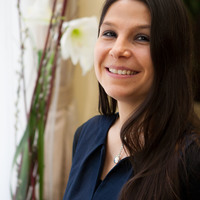- Doctor of Philosophy (PhD), Human Resources and Organisational Studies at the Faculty of Social Sciences at the University of Ljubljana. PhD thesis: Acquiring Competencies through Non-Formal Education in Youth Organizations. Graduated at the Faculty of Arts at the University of Ljubljana and holds a master’s degree from the Faculty of Management at the University of Primorska. Works as the Head of Expertise a... moreDoctor of Philosophy (PhD), Human Resources and Organisational Studies at the Faculty of Social Sciences at the University of Ljubljana.
PhD thesis: Acquiring Competencies through Non-Formal Education in Youth Organizations.
Graduated at the Faculty of Arts at the University of Ljubljana and holds a master’s degree from the Faculty of Management at the University of Primorska.
Works as the Head of Expertise at e-Študentski Servis (ŠS d.o.o.), the biggest youth employment agency in Slovenia (Strokovna vodja e-Študentskega Servisa) & Youth and Labour Market Expert.
Research interests: competencies, youth organizations, non-formal education, youth, young people, student work, labour market.edit
Research from the field of non-formal education (NFE) in youth work emphasises the central role of experiential learning and learning in groups. The present paper aims to research teaching methods and teaching formsin NFE in youth work.... more
Research from the field of non-formal education (NFE) in youth work emphasises the central role of experiential learning and learning in groups. The present paper aims to research teaching methods and teaching formsin NFE in youth work. The research sought to answer the following research questions: ‘What teaching forms can be found in NFE for young people in youth councils on a national level in Slovenia?’ and ‘What teachingmethods can be found in NFE for young people in youth councils on a national level in Slovenia?’ Data was collected using semi-structured interviews; the instrument was a list of questions. The empirical research was conducted in July 2016 with six interviewees. The results indicate that learning in selected NFE in the National Youth Council of Slovenia (MSS) is participatory, interactive, inclusive and student-focused; with central concepts of experiential learning and learning in groups. The key teaching form is learning in groups. However, individual work, wo...
Research Interests:
Young people participate in non-formal education in youth organizations and youth centres. The main goal is not the acquisition of competencies and increasing employability, it is a side-effect. The hidden curriculum contains inclusion of... more
Young people participate in non-formal education in youth organizations and youth centres. The main goal is not the acquisition of competencies and increasing employability, it is a side-effect. The hidden curriculum contains inclusion of young people in further education and youth work in the direction of positive youth development. In the qualitative research, 59 individual in-depth semi-structured interviews with three groups of interviewees were conducted, with 23 young participants, 20 providers of education and 16 organizers and an evaluation focus group with experts.
The results show that non-formal education in youth centres is very diverse in terms of content and time. Methods of youth work are used, with active involvement of participants. The experiential learning is most ubiquitous. It is accompanied by learning-by-doing, learning-from-mistakes, peer learning, mentoring and evaluation. Programmes are inclusive, containing support activities (ice-breakers, getting-to-know-each-other games, energizers and team-building games). The emphasis is on working in groups. Roles are fluid; participants are motivated to (later) become providers and organizers. Young people feel safe, accepted, heard, understood, included and welcome.
Young people mainly acquire key competencies for lifelong learning. The greatest emphasis is on active citizenship, literacy and personal, social and learning-to-learn competence. Among the competences for work, teamwork is in the foreground. Young people develop other competencies; among them organizational competencies, topic-specific competencies and competencies of youth work and working with young people. The competencies benefit them in all aspects of life, as they make important friendships, establish positive relationships with adults, gain self-confidence, etc.
The competencies benefit them in career orientation, obtaining first employment and in performing work. They establish contacts with peers, adults, organizations, decision makers, employers and community. Acquired social network and social capital benefit them in all areas of life, both in personal and career life.
The results show that non-formal education in youth centres is very diverse in terms of content and time. Methods of youth work are used, with active involvement of participants. The experiential learning is most ubiquitous. It is accompanied by learning-by-doing, learning-from-mistakes, peer learning, mentoring and evaluation. Programmes are inclusive, containing support activities (ice-breakers, getting-to-know-each-other games, energizers and team-building games). The emphasis is on working in groups. Roles are fluid; participants are motivated to (later) become providers and organizers. Young people feel safe, accepted, heard, understood, included and welcome.
Young people mainly acquire key competencies for lifelong learning. The greatest emphasis is on active citizenship, literacy and personal, social and learning-to-learn competence. Among the competences for work, teamwork is in the foreground. Young people develop other competencies; among them organizational competencies, topic-specific competencies and competencies of youth work and working with young people. The competencies benefit them in all aspects of life, as they make important friendships, establish positive relationships with adults, gain self-confidence, etc.
The competencies benefit them in career orientation, obtaining first employment and in performing work. They establish contacts with peers, adults, organizations, decision makers, employers and community. Acquired social network and social capital benefit them in all areas of life, both in personal and career life.
